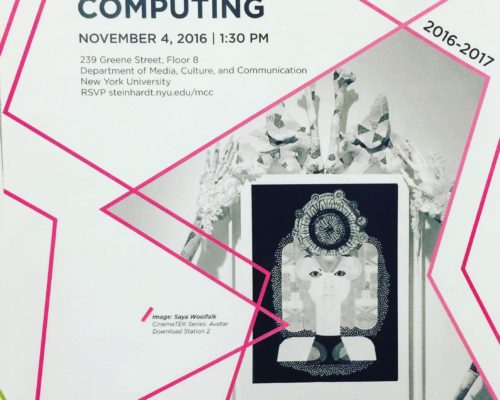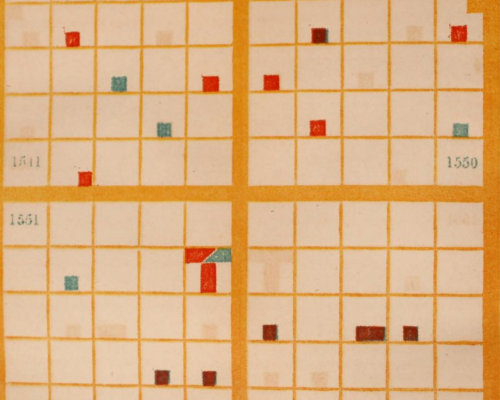In October, the Institute of Fine Arts at New York University brought together art historians, non-profit professionals and art publishers for a symposium not only on the new phenomena of publishing traditional art historical scholarship online, but on how it relates to publishing digital humanities in art history online. Organized by the online art journal, Nineteenth-Century Art Worldwide and funded…
Category: Event Reviews
Research Without Borders At Columbia University. Effecting Change in Scholarly Communication: Opportunities and Costs
Abstract: Columbia University Libraries hosted a Research Without Borders Event November 21. The event focused around scholarly publishing. The speakers spoke about alternatives to traditional methods of publishing and alternatives to open source with a focus on the economy of publishing. A running theme during the event was re imagining traditional methods to publishing and open source and how authors…
“Conditions of (In)Visibility: Cultivating a Documentary Impulse in the Digital Humanities,” Keynote address by Roxanne Shirazi at Florida State University Library’s Invisible Work in the Digital Humanities Symposium, November 18th, 2016
Abstract: On November 18th, 2016, Roxanne Shirazi delivered a keynote address at Florida State University Libraries’ symposium on Invisible Work in the Digital Humanities. Her presentation, titled “Conditions of (In)Visibility: Cultivating a Documentary Impulse in the Digital Humanities,” addressed the way that focus on a final product, rather than an iterative process, obscures the labor and laborers necessary to create…
Protected: Decolonial Computing: Histories and Futures
There is no excerpt because this is a protected post.
“The Shape of History: Reimagine 19th Century Data Visualization” by Lauren Klein at Columbia University
Professor Lauren Klein of Georgia Institute of Technology conducted a talk on “The Shape of History: Reimagine 19th Century Data Visualization.” In her lecture she examines the history of data visualization through various visualization pioneers such as Elizabeth Peabody (1804-1894), William Playfair (1759-1832), Emma Willard, and Joseph Priestley. Professor Lauren Klein aimed to demonstrate the relevance of data visualization in a historical sense in today’s visualizations. Klein also discusses her own personal works with Elizabeth P. Peabody’s mural charts and the advances within her project.
“Digital Accessibility and the Making of a Meta Maker Movement” A Talk by Dr. Joshua Miele hosted by GC Digital Initiatives at The Graduate Center, CUNY on Thursday, October 20, 2016
On Thursday, October 20 at 6:30pm, Dr. Joshua Miele, of the Smith-Kettlewell Eye Research Institute, gave a talk on “Digital Accessibility and the Making of a Meta Maker Movement” at the Graduate Center, CUNY. Dr. Miele was invited by GC Digital Initiatives to discuss the fundamental understanding of accessibility within the maker movement, and the work he and his team has done to provide blind makers the necessary tools and resources they need to help design their own tools in order to engage in the maker movement. Dr. Miele emphasised the significance of collaboration between blind and sighted people, and the inclusion of blind people throughout the design process and in the management and running of an accessible makerspace.
NYU Center for the Humanities hosts “Distracted Reading: Acts of Attention in the Age of the Internet” event on Tuesday, September 27, 2016
The NYU Center for the Humanities held an event entitled “Distracted Reading: Acts of Attention in the Age of the Internet”on Tuesday September 27 at 6 p.m. that addressed the concept of “distracted reading,” or the idea that students’ attention is being diverted to technology rather than their class work. Speakers at the event, which was moderated by Marion Thain, Associate…
Protected: DH Events: ‘Distracted Reading: Acts of Attention in the Age of the Internet’ by NYU
There is no excerpt because this is a protected post.
Event Review of Cuneiform Digital Library Initiative Lecture
Sara Sheer Event Review Summary: Professor Robert Englund of the Cuneiform Digital Library Initiative (CDLI) gave a lecture on the digitization of cuneiform texts. He described how the tablets had been scanned, then transcribed, translated, transliterated and annotated into machine-readable-code. This data was then organized into databases for the benefit of researchers. The geographic dispersal of cuneiform texts and…
“Specialization and Diversity in Dutch and Flemish Printmaking,” a lecture by Matthew Lincoln, The Frick Collection, April 7, 2016
In his lecture “Specialization and Diversity in Dutch and Flemish Printmaking: A Computational Approach,” PhD candidate Matthew Lincoln explored two separate but related questions pertaining to sixteenth- and seventeenth-century Dutch and Flemish printmaking and painting. As part of the Frick Collection’s Digital Art History Lab lecture series, both parts of the lecture addressed how the study of art history can…



